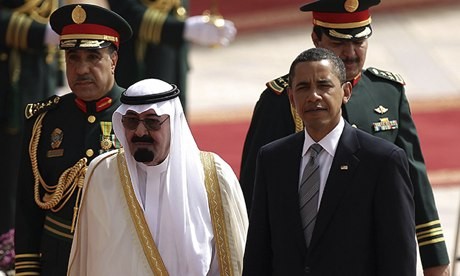(VOVworld)- US President Barak Obama will visit Saudi Arabia after his tour of 3 European countries beginning on Friday. During his second trip to Saudi Arabia since 2009, President Obama hopes to improve bilateral ties, a goal which could prove challenging.

King Abdullah bin Abdul Aziz al-Saud with President Barack Obama during an arrival ceremony at the King Khaled international airport in Riyadh in June 2009 Photograph: Mido Ahmed/AFP/Getty Images |
Saudi Arabia and the US initiated diplomatic ties 70 years ago. During this visit, the US President will focus on regional security, the civil war in Syria and talks on Iran’s nuclear program. Mr. Obama will also meet with leaders of the Gulf Cooperation Council at its headquarter in Riyadh.
Existing disputes
Prior to the US President’s visit, White House spokesperson Jay Carney said Saudi Arabia is the US’s close ally. Despite differences, the two countries maintain close relations. This statement by the White House was aimed at reassuring the public despite recent rifts considered the worst in the 70-year-old relationship.
Since 2011, the alliance between the US and Saudi Arabia has been tested by unrest in the Middle East and North Africa. Saudi Arabia is keenly concerned about US responses to sensitive issues in the region, such as development in Iran, Syria and Egypt. Last year, Saudi Arabia’s Prince Turki Al Faisal strongly criticized the US Middle East policy, especially regarding Syria and the Iran nuclear negotiations.
During his visit, Saudis are expected to closely question Mr. Obama about the latter’s refusal to hold Syrian President Bashar Al Assad to account for crimes against the Syrian people and his sudden decision not to intervene militarily in Syria last summer.
Saudi Arabia will probably bring up Washington’s support for the Muslim Brotherhood in Egypt. This is an important issue because Saudi Arabia recently withdrew its Qatar Ambassador to reject Qatar’s support for the Muslim Brotherhood. The US softened policy toward Iran also worries Saudi Arabia and several other Gulf countries, who are concerned about Iran’s suspected nuclear ambitions and its strong support for President Assad.
Mr. Obama’s visit will be more difficult because Saudi Arabia has begun seeking alliances in Asia to replace its reliance on the US. Saudi Arabian Prince Salma recently visited Pakistan, India, China and Japan.
Pleasing its ally
The US is well aware of the strain in its relationship with Saudi Arabia. On March 18th, Washington asked the Syrian government to close its embassy in Washington and its consulates in Michigan and Texas. Those who work in these offices who are not Americans are required to leave the US before March 31st. In a meeting with Saudi Arabia’s Deputy Defense Minister Prince Salman Bin Sultan in Washington on March 20th, US Secretary of Defense Chuck Hugel emphasized the importance of bilateral military cooperation and reiterated Washington’s commitment to security in the Middle East.
3 days before his visit, in a meeting with Crown Prince Sheik Mohamed Bin Zayed of Abu Dhabi, President Obama said the US will not let its traditional ally in the Gulf region feel being abandoned.
The relationship between the US and Saudi Arabia is based on mutual benefit. Over the past 70 years, the US has been a powerful supporter of Saudi Arabian security. In return, the US has benefited from Saudi Arabia’s oil and location to exert its influence in the Middle East.